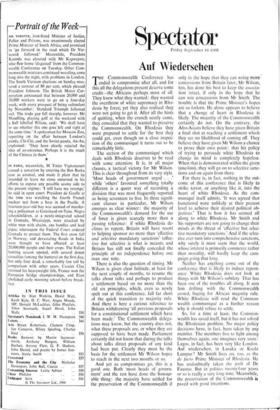Auf Wiedersehen
The section of the communiqué which deals with Rhodesia deserves to be read with some attention. It is, in all major clauses, a tactical victory for Mr Wilson. This is clear throughout from its very style. `Most heads of government urged . . while 'others' favoured something totally different is a queer way of recording a division that was most frequently reported as being seventeen to five. In three signifi- cant clauses in particular, Mr Wilson emerges as clear winner: the majority of the Commonwealth's demand for the use of force is given scarcely more than a passing reference: if white Rhodesia de- clines to repent, Britain will have resort to helping sponsor no more than 'effective and selective mandatory sanctions' (effec- tive but selective is what is meant); and Britain has still not finally conceded the principle of no independence before one man one vote.
There is also the question of timing. Mr Wilson is given clear latitude, at least for the next couple of months, to resume the talks about talks and perhaps to produce a settlement based on no more than the old six principles, which, even as newly spelt out at this conference, fall far short of the quick transition to majority rule. And there is here a curious reference to Britain withdrawing 'all previous proposals for a constitutional settlement which have been made.' The Commonwealth delega- tions may know, but the country does not, what these proposals are, or when they are supposed to have been made. Parliament certainly did not know that during the talks about talks direct proposals of any kind had been put. Clearly they must be the basis for the settlement Mr Wilson hopes to reach in the next two months or so.
And yet as compromises go, this is a good one. Both 'most heads of govern- ment' and the rest have done the honour- able thing: the majority have settled for the preservation of the Commonwealth if only in the hope that they can wring more– concessions from Britain later; Mr Wilson, too, has done his best to keep the associa- tion intact, if only in the hope that he can win concessions from Mr Smith. The trouble is that the Prime Minister's hopes are so forlorn. He alone appears to believe that a change of heart in Rhodesia is likely. The majority of the Commonwealth certainly do not. On the contrary, the Afro-Asians believe they have given Britain a final shot at reaching a settlement which they see no likelihood of coming off. They believe they have given Mr Wilson a chance to prove their own point : that his policy of trying to persuade white Rhodesia to change its mind is completely hopeless. When that is demonstrated within the given time-limit, they will go on to selective sanc- tions and on again from there.
For there is, in fact, nothing in the out- come of this conference that is likely to strike terror, or anything like it, into the heart of white Rhodesia. As the com- muniqué itself admits, 'It was agreed that [sanctions] were unlikely at their present level to achieve their desired political ob- jectives.' That is how it has seemed all along to white Rhodesia. Mr Smith and his supporters are not going to change their minds at the threat of 'effective but selec- tive mandatory. sanctions.' And if the selec- tive ever turn into comprehensive sanctions, why surely it must seem that the world, whose interest is primarily commerce rather than morality, will hardly keep the cam- paign going that long.
Neither has anything come out of the conference that is likely to induce repent- ance. White Rhodesia does not look at things with Mr Wilson's subtlety. That has been one of the troubles all along. It sees him drifting with the Commonwealth crowd, baying for African majority rule. White Rhodesia will read the Common- wealth communiqué as a further reason why it should refuse to settle.
So, for a time at least, the Common- wealth has saved itself, but it has not solved the Rhodesian problem. No major policy decisions have, in fact, been taken by any member. The members live to fight among themselves again, one imagines very soon: Lagos. in fact, has been very like London.
Auf wiedersehen, in Lusaka or Kuala Lumpur? Mr Smith lives on, too, as the de facto Prime Minister of Rhodesia. He has undoubtedly taken the path of Dr Faustus. But in politics twenty-four years or so is really a very long time. Meanwhile, the preservation of the Commonwealth is paved with good intentions.


































 Previous page
Previous page